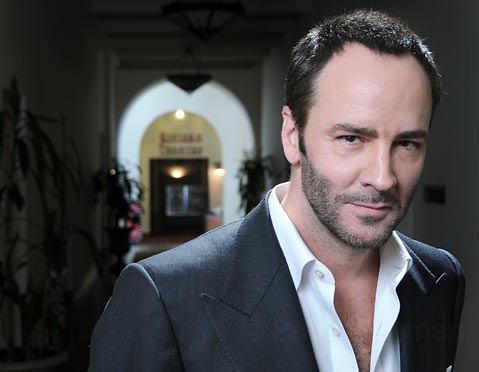A Singular Man
Fashion Designer Tom Ford Discusses A Single Man, His Directorial Debut

In 2004, when fashion designer Tom Ford left Gucci, he declared he wanted to make movies. I laughed, along with the rest of the world. Well, he’s having the last laugh now, because A Single Man-his adaptation of Christopher Isherwood’s classic novel-is a most auspicious directorial debut. It depicts a day in the life of a gay professor in the ’60s as he tries to deal with life after the loss of his longtime companion. Colin Firth is masterful as George as is Julianne Moore playing his best friend, and both were nominated for Golden Globes last week. In person, Tom Ford-who came to Santa Barbara to discuss his film this fall-is quite fascinating. There’s no flaw in his physical appearance, and he’s seductively charming, but it’s his soulfulness that disarms you.
Why did this book become your directorial debut? I originally read this book when I was in my twenties living in Los Angeles in the early ’80s, and I was really struck by the character of George. I fell in love with George. I met Christopher Isherwood that same year, and I read all of his work and really became quite obsessed with Christopher. When I really started looking for the right film project, I knew what I stood for as a fashion designer but I had to look inside myself and ask, “What do I have to say in a Tom Ford film? What does it have to mean?” I had optioned a couple other books and I was working on them and they weren’t really becoming what I felt was something powerful enough to spend the energy and time to put it on the screen. I was driving to my office in Los Angeles one day and I was thinking about George, and I was like, “Okay, I’ve been thinking about George off-and-on for the last 30 years. I should pick up this book again.” I picked it up and it was an entirely different book to me. The point of the book is to really appreciate the smaller things in life. It’s about isolation, romance, and it spoke to me in an entirely different way. I was determined, and just had an intuitive feeling that this was for me.
The film is very stylish, but so substantive. The details in the house where George lives, the way he dresses further tell us the story. For me, style is nothing without substance and the style in the film was really there to help us understand the character. For example, George moves to America because he loves the good things about America. He loves the straightforward quality of America-the honesty-that’s why he falls in love with Jim, who is simple in that way. I don’t mean simple in a small way, but simple in that he’s honest and straightforward. So I thought George would want a modern house-he’s going to want something that has that dynamism of where America was in that moment he came to America. Yet this is a college professor who grew up in dark paneled rooms in England and would want the warmth of a cozier version of a modern house.
George’s belongings, the way he dressed-that’s what keeps him together. Inside, he’s a very romantic, damaged guy, and he just holds himself together by this shell that he puts on, you know, to get him through the day. That’s very important to him. Not to sound too zodiac, but Christopher Isherwood was a Virgo : they’re perfectionists-their inner world and their outer world is very related, and his stories were all autobiographical. I’m a Virgo, Colin Firth is a Virgo. We keep ourselves together by organizing everything.
Why was Colin Firth always your first choice to play George? Colin has a certain smoothness on the surface, a certain detached quality in every part I’ve ever seen him in yet. There’s so much more there, and you feel it. He somehow projects it, and that was perfect for the character of George. He was also the right age, the right nationality-lots of things-but it’s the subtlety of his performance. : Colin has the ability to seemingly, without moving a thing, telegraph to you what he’s feeling or what his character is feeling, and that was exactly what this role needed.
Christopher Isherwood’s longtime companion, Don Bachardy, is in the film briefly. He’s in the faculty lounge, sitting on the sofa with my longtime companion [Richard Buckley] on the other end of the sofa, and the camera pans by both. Don has a line, Richard doesn’t.
Was Don involved in the production? Oh yeah. Don was wonderful because I altered the story quite a bit, and I was concerned. : Did Don feel that we were staying true to the point of the book? He was extremely supportive. For example, Julianne’s character in the book is very, very different than the character you saw onscreen. I asked Don, “Do you think it’s bad that she’s now this glamorous woman and that they had this past relationship?” He said, “It’s very funny you did that because the real character was based on Iris Tree, who was this very stylish woman and a good friend of Christopher’s, and he didn’t want her to know that he basically pulled their relationship and this is really what he thought of her.” He [helped change] the character, so there were certain things that oddly were true to more the real-life story than the story that you read in the book. This story was written by Christopher when Don left him for about eight months and moved to New York. Christopher was devastated, and he imagined that he was all alone and that Don had died, and wrote A Single Man. Don quickly came back and they were together for 42 years. Don was 18 and Christopher was 48 when they met, and it really turned out to be the love of their lives.
Was there something that surprised you about the filmmaking process? Editing. I had always heard that line about a great film can be made in a cutting room. I spent much longer editing than I would ever have thought-the ability to change a scene, change the tone, and change the pacing, even change the story and twist things around in the editing room.
Have you now exorcised George out of you? I don’t think I’ll ever exorcise George out of me. George was with me for a long time. George is going to be with me forever. Film, for me, is a kind of alternate universe where I sometimes forget that certain characters-I forgot Scarlett O’Hara wasn’t really real. I go to Atlanta and I expect to see her on Peachtree Street. : As a fashion designer, you put so much energy into something and it lasts [snaps] that long. That moment when you see someone in something new is riveting and powerful, three months later you see it a few times, a year later the woman puts it in the back of her closet. You can later see it in a museum, and you can say, “Wow, look at the cutting, look at that stitching. That was amazing.” But it doesn’t have that emotional power. Film is sealed in a little bubble forever. You watch an old movie and you’re sucked right back in-you’re crying with them, you’re laughing with them, you’re living that moment with them. That is so appealing if you’re someone who is creative. I have had more fun doing this than doing anything I’ve ever done in my life.
4•1•1
A Single Man opens in Santa Barbara theaters this weekend.



